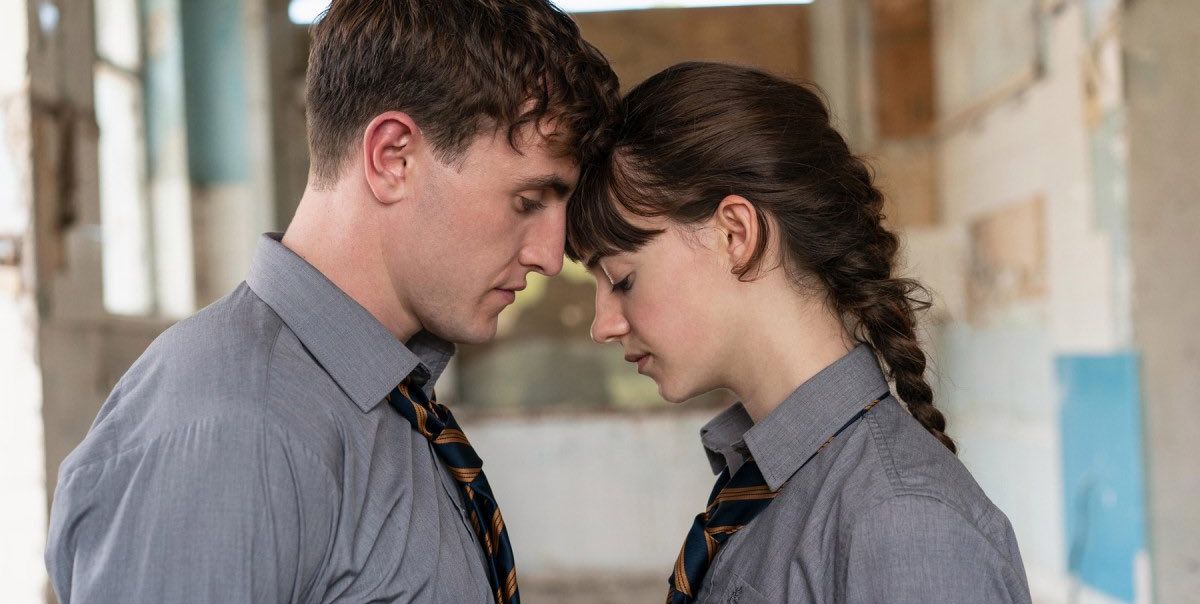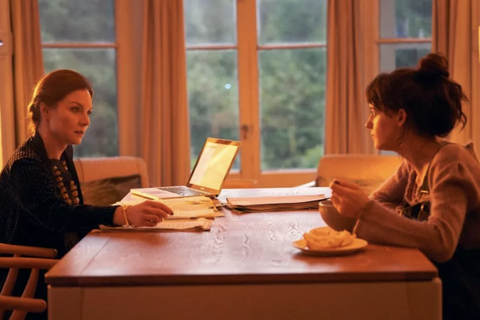If every book-to-TV adaptation were as astute as Normal People, I’d burn the very dumb T-shirt I bought in college that reads, “The Book Was Better.” The 12-part series, released April 29 on Hulu, might actually be better than Sally Rooney’s award-winning, debate-stirring, best-selling text.
Normal People is a simple enough story: It follows two young lovers in Ireland as they move in and out of each other’s lives throughout secondary school and university. But the showrunners never treat the tale as one-dimensional. Because the script lifts lines of dialogue directly from the source material, I could literally sit with my book open on my lap and follow along with each word Marianne Sheridan (Daisy Edgar-Jones) and Connell Waldron (Paul Mescal) speak. So many details are precisely represented, both major and minor—from the lemon pastry Marianne eats each morning in Sweden to the dirty trainers Connell wears during his tour of Europe. Nothing is throwaway—the show treats the book like something sacred, its details worthy of the devotion of a religious zealot.
But there are some changes that affect the tone and, at some points, the meaning of the original story. As one of many fans who read Normal People for the first time in a voracious rush, I re-read the book as I watched the show, picking out every single significant change from the text. Here’s what they mean for Marianne and Connell’s love story.
The show follows a chronological timeline.
Rooney’s novel makes a concerted effort to warp the timeline of Marianne and Connell’s love affair, racing weeks forward and backward within the same chapter—sometimes within the same paragraph. This creates the sense that Marianne and Connell have always been connected, and always will be.
The show offers a more linear story that’s easier for viewers to digest. For instance, in the first scene of the book, Marianne and Connell strike up a conversation while Connell’s mother, Lorraine, finishes her work as a housekeeper at Marianne’s. This is the moment Marianne tells Connell she likes him for the first time. In the show, this scene takes place days later, at school rather than at home.
Lenny Abrahamson, who directed the first six episodes, told BT.com that production initially wanted to follow Rooney’s shifting timeline, but ultimately opted for something that felt more comprehensible onscreen. It’s a smart, intuitive choice.
There are small but impactful changes to how Connell and Marianne’s relationship is depicted at school.
One of Normal People’s strongest themes is perception—how others view us and why it colors our view of ourselves. Connell’s confusion and insecurity in secondary school leads him to keep his relationship with Marianne a secret because she’s a loner his friends consider unusual and ugly. In the book, Connell never interacts with her at school. He never makes eye contact. He barely acknowledges her existence.
The line isn’t drawn quite so boldly in the show. In select episodes, his gaze frequently wanders to hers during class. He talks to her in the hallway after school before he goes to football practice. These little moments of connection make his denial of their relationship all the more wrenching. In one of the early episodes, when Connell’s friend Eric calls Marianne an “ugly flat-chested bitch” in front of Connell, he does nothing. In the book, he’s not present and doesn’t hear the comment. But in the show he refuses to stand up for the girl he loves. The denial is a hundred times more heartbreaking than in the novel.
Mescal gives life to Connell’s emotional journey.
Producer Emma Norton told BT.com, “I think what Sally [Rooney] and [co-writer Alice Birch] were really good at…were finding little moments in the book that sometimes might have just been a sentence, and expanding it out into a full, sometimes very emotional scene.”
This is powerfully apparent with Connell. I don’t think it’s too big-headed to say Mescal deserves an Emmy for Normal People. We get to watch Connell’s breakdowns rather than hear about them through description and monologues. It’s immensely powerful to watch a young man who likes football and beer and sex and all the things young men are “supposed” to like doing something young men are not “supposed” to do: weep. Show emotion. Break.
As Connell collapses into heaving sobs on the side of the road shortly after realizing the extent of his betrayal to Marianne, we understand the magnitude of this young man’s feelings. They’re there. They exist. Perhaps this shouldn’t make us uncomfortable—blame gender roles for that one—but it does. I applaud the show putting it on our screens. Men need to see it—we all need to see it.
The show is more sympathetic to Marianne’s mother.
One of the more significant changes between the book and the show is its depiction of Denise (Aislin McGuckin), Marianne’s mother. When we first meet her, she’s doing stereotypically rich lady things: sipping white wine, complaining about work, criticizing her daughter. Yet there’s some degree of tenderness in how she handles Marianne. She asks her daughter to pick out new tile for their property in Dublin wheree Marianne will be living there during college. Marianne is stunned by this tiny olive branch.
But we begin to understand the depth of Denise’s flaws as Marianne’s brother Alan (Frank Blake) repeatedly mistreats his sister. In the book, Alan gets so angry at Marianne for “bragging” about her grades during dinner that he spits on her. Denise responds to Marianne’s shock with a glib insult: “If you can’t handle a little sibling rivalry, I don’t know how you’re going to manage adult life, darling.” In the show, this interaction is more nuanced, less overtly cruel. After the violent incident—Alan douses Marianne’s head in dishwater rather than spitting on her—Denise tells Marianne, “You’re very different, you and your brother. It’s difficult for him.” When Marianne asks why she puts up with it, Denise responds, “What do you think I should do? Kick him out? How do you think I should handle this, exactly? ‘Cause I’d love to have your insight. Because I’m trying to do the best I can.”
We eventually learn that Denise endured abuse at the hands of her husband. This conversation gives us deeper insight into how Denise is trapped within a cycle of abuse. She might want to help her daughter, but she can’t— she’s as caught in the web as Marianne is. We don’t get this much clarity in the book.
Marianne’s abusive relationship with her brother, Alan, is less overt.
In a somewhat similar vein, Marianne’s relationship with her brother, Alan, is blurrier. He’s still abusive—there is no doubt of that—but his depiction makes me think the show wants to demonstrate how easy it is for people, especially women, to endure repeated trauma but not register it as trauma because it’s so twisted and psychological.
In the book, Alan is plainly violent. He spits on Marianne. He grabs her arm and wrenches it so tightly it throbs. In the book’s final pages, after he throws a beer bottle in her direction, he chases her to her room and wrestles with her door, screaming for her to open it until it knocks against her face and breaks her nose. “Are you going to blame me for that now?” he demands.
In the show, his actions are less physical but no less horrific. He forces her to walk to school in the pouring rain. He pours that dishwater over her head. And when he breaks her nose, it happens so quickly, he might’ve convinced himself it was an accident.
We see this confusion even in Marianne’s conversations with Connell. When she tells him her father used to hit her mother, Connell asks if he ever hit her. In the book, she says, “Sometimes.” In the show, she says “no” but starts to cry. We’re supposed to wonder if she’s lying or just confused.
This helps us understand how Marianne becomes a self-possessed person who also believes herself to be so dirty and degraded that she deserves abuse. It’s absolutely gutting to watch, but an accurate and stunning portrayal of manipulation.
Marianne has a different reason for her S&M with Jamie.
It’s really difficult to decide which of Marianne’s multiple ex-boyfriends is worse: the neo-Nazi sympathizer, the first abuser, or the second abuser. “Free speech” enthusiast Gareth is basically the same as in the book, but Jamie—ugh, Jamie. In many ways, he’s also the same character in both the book and show: A privileged, racist jerk who lingers around Marianne during her relationships with Gareth and Connell until he can swoop in. What differs is Marianne’s relationship to their sex life.
In the show, Marianne is confident there’s nothing wrong with Jamie using a belt to hit her. She wants to be degraded. She tells Connell during a coffee meet-up that Jamie’s sadism is something she actually enjoys. When Connell suggests it sounds horrible, she says, “It’s not. It’s just different.”
But in the book, she tells him, “I don’t know if I really like it.” Then she adds, “I suggested it to him, that I could try being more submissive. And it turns out he likes to beat me up…I mean, I don’t enjoy it. But then, you’re not really submitting to someone if you only submit to things you enjoy.” Then, because she feels she’s being disloyal to Jamie, she asks Connell, “Who wouldn’t want to beat me up?” He responds, “I wouldn’t.”
Hulu’s adaptation takes time to explore the notion that abuse can be more deceptive than it seems. In the book, Marianne clearly has doubts. But in the show, she’s convinced herself that everything is fine and she deserves this. She can’t register the red flags; maybe she even wants it, so there’s nothing wrong. But Connell—and the audience—knows there is.
Marianne breaks off her relationship with Lukas in a quieter manner.
Lukas is yet another terrible ex, but he’s one the show introduces in a remarkably different fashion. For one thing, the show’s Lukas doesn’t have the thick Swedish accent Book Lucas wields like some sort of status symbol. We also see the moment he meets Marianne at a party, and later, a scene in a cafe where she tells him she wants to break up.
This scenes never happen in the book, but they’re illuminating onscreen. Lukas leans forward, confused, and pleads with Marianne to change her mind, adding, “I really like you.” The comment seems to disgust her. She recoils, insisting she wants him to behave in the opposite way. Degrade her. Hate her, even.
So he does. They have forceful, painful-looking sex where he ties her up and calls her “worthless.” “You’re nothing,” he says. In the book, Rooney writes, “It’s hard to know whether Marianne likes to hear those things; she desires to hear them, but she’s conscious by now of being able to desire in some sense what she does not want.”
They have a similar relationship in the book, but it’s not one Marianne asks for so directly. Instead, this seems to have been their relationship from the start: He gets off on degrading her, and she endures it because she feels empty anyway. Yet when Lukas leans in and tells her he loves her—after tying her up and taking naked photos of her—she is horrified. “Get away from me,” she says. “Don’t ever talk to me like that again.” And she leaves.
In the show, her exit is quieter. He ties her up. He takes her photos. When she asks him to stop and says “no,” he responds, “This is what you wanted.” She can’t deny that, can’t explain it, so she stops protesting and lets him finish. He never says, “I love you.” She leaves quietly, and we’re led to believe they never see each other again.
Neither depiction is necessarily more visceral or more meaningful. Both are horrible. But the show’s version gives us a clearer understanding of just how unworthy Marianne thinks she’s become.
The final scene is completely rewritten and changes how we should interpret the ending.
For the most part, the later scenes of the show align carefully with the final pages of the book: Connell and Marianne reconcile, but freeze up when Marianne asks him to hit her. She goes home in tears. Her brother throws a bottle at her and breaks her nose with the door. She calls Connell, who arrives and threatens to kill Alan if he touches Marianne again. Connell promises her he’ll never let someone hurt her again.
But here’s where the endings diverge. In the book, Connell receives an email from a New York university inviting him to join the school’s creative writing MFA program. Marianne, shocked, asks him why he told his friend Sadie about the application but not her. She asks if he’s in love with her. The answer is, of course, no. Then she tells him he should go and doesn’t explain why. The last line of the book reads, “You should go, she says. I’ll always be here. You know that.”
The show shifts the mood. When Connell first gets the email, Marianne tells him “it’s brilliant.” But he’s confident it’s the wrong choice, so he tells her he’s not going. They discuss it again days later, after Christmas and New Year’s celebrations, after they’ve kissed in public in front of all their old school friends, as Marianne is packing up her old apartment. She tells him she’s been thinking about him going to New York. He admits he’s been thinking about it, too.
“Would you come with me?” he asks. “We could be there together, and you could study or work.”
She shakes her head and he asks why. “I want to stay here,” she says. “I want to live the life I’m living. It’s quite a thing, I know. And I’m getting better at it.” This is the first time we see her wanting something for herself, the first time she’s happy and not desperate to be controlled or injured. She finally recognizes her own worth. She should be loved. She knows she is loved.
His voice gets shaky. “It’s only a year, and then I’d be back.” She’s realistic. “Don’t promise that,” she says. “You don’t know where either of us will be or what will happen.” They’re both crying softly now. “I wouldn’t be here if it weren’t for you,” he says. She agrees. “You’d be somewhere else entirely. You’d be a different person. I’d be, too. But we’ve done so much good for one another.”
Him: “You know I love you. And I’m never going to feel the same way for anyone else.”
Her: “I know.”
Him: “I’ll go.”
Her: “And I’ll stay. And we’ll be okay.”
This moment is so raw, so quietly beautiful, that it’s hard to digest all the meaning imbued in their words. I was personally dissatisfied with Normal People’s original ending—why was Marianne jealous about Sadie? Why did she push Connell to leave? Why is she the one who “will always be here,” when Connell has shown that he, too, is loyal?
The show’s ending creates more equality between the two protagonists. Their final scene demonstrates an understood consistency in their lives: No matter where they go next, they will be there for each other. Their lives are forever bound. They have each found happiness on their own terms: They understand their value apart from each other, but they will always belong, in some invisible but unchangeable way, to each other. That’s a healthy relationship. That’s a good relationship. It’s an end and a beginning, a chance to meet again.





